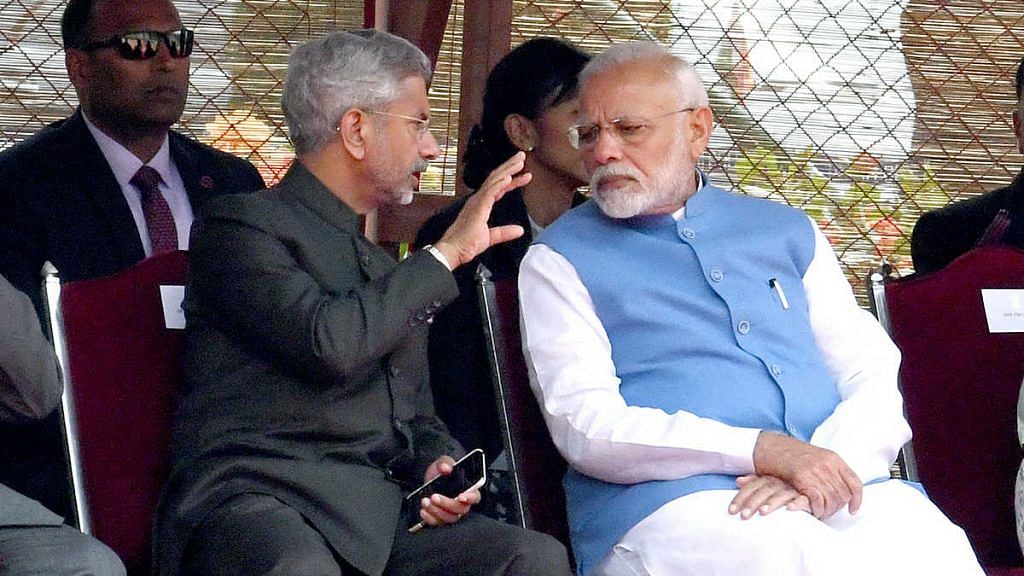India’s appeasement policy towards China has met its inevitable, tragic denouement. But as inevitable and tragic as this was, it will be compounded if India hesitates, yet again, to respond with clarity and purpose. Until now, every Chinese signal that the northern neighbor was engaged in a containment strategy against India, has been ignored by New Delhi. It no longer should be the case.
Moreover, until now, India has been insistent that it will not join any effort that reeks of containment of China. However, China’s behaviour, not just towards India, but also towards many others, is a clear indication that Beijing will employ its enormous power entirely to dominate the region. China is not a power that the rest of the Indo-Pacific can live in peace with. It has demonstrated that it does not respect anyone’s desire to stay above the fray. The choice China presents to India and everyone else is admirably clear: acquiesce or fight. Sooner or later, all will have to choose.
Also read: Newborn, debt-ridden family: What 2 jawans killed in Galwan leave behind in native Jharkhand
Why the dragon must be tamed
China must be contained not just because it has killed Indian soldiers, or prevented India’s entry in the Nuclear Suppliers Group, or of the countless ways in which it has attempted to contain India. It must be contained because China won’t stop doing any of this. It will not stop escalating on the Line of Actual Control (LAC), or containing India, or attacking its neighbours. Containing China is not a choice, but simply the lack of it.
It will not be easy, though. China is already wealthier than all the regional powers in the Indo-Pacific combined. It accumulates more wealth each year than all of them put together. Its military dwarfs all others in the region; only India even comes close, at least along the Tibet border.
Containing this behemoth is impossible without the United States as part of the equation. The US is the only power in the world today that has more wealth, greater military power and global influence than China. The balance is definitely shifting against the US but it will take much longer, even if current trends continue, before China becomes the dominant power in an Indo-Pacific that includes the US. America’s unsteadiness is a problem but India has no other choice. Moreover, expect America to steady itself because China’s imprudence will leave it no choice.
Also read: Congress and BJP both want action against China incursions, but only when in opposition
The containment strategy
China’s power must also be set against its disadvantages. It has antagonised most of its neighbours. Its coercive use of trade against countries, near and far, has not only raised concerns but started an embryonic movement in many countries to limit their vulnerability. While Japan is paying its companies to relocate out of China, the US is considering an Economic Prosperity Network of trusted trade partners.
Its aggression against India follows its forcible takeover of the South China Sea, brushing aside the claims of others. China demonstrates neither moderation nor self-interested pragmatism. This is a critical disadvantage that glues the coalition.
China’s geography is another disadvantage for Beijing. True, a large country with internal lines of communication has some advantages and creates difficulties for coordinating action between countries as far away as Japan, Australia and India. However, China is also hemmed in by chokepoints controlled by others, a particularly critical disadvantage for a country that depends on trade as much as China does. Coordination between different regional players can help control these chokepoints and cut them off, should such a need ever arises.
Also read: China has an Achilles’ heel. India must take the battle there from LAC
India’s reluctance won’t help its cause
But such coordinated action cannot happen if, in addition to the US, India does not participate. India is one of the most powerful countries in the Indo-Pacific, both in economic and military terms. Any reluctance by India will reduce not only the willingness of smaller powers to join a containment effort, but also affect American calculations of cost and benefits. New Delhi has until now assumed that it can largely free-ride on the balancing efforts of others and get the best of both worlds. Such buck-passing strategies work if others are motivated enough to bear these burdens by themselves. But this approach becomes risky, because everyone could suffer if all stakeholders pass the buck. Containment is an even more difficult sell if a country as strong as India continues to free-ride.
India can demonstrate its commitment by example. It must begin limiting its economic relations with China, even if it cannot completely decouple. There are not just good strategic reasons for immediately banning Huawei from India’s 5G systems, but it will also send a clear message of India’s commitment.
New Delhi also must reiterate its objection to the China-Pakistan Economic Corridor (CPEC) through Pakistan-occupied Kashmir (PoK), and plan to militarily retake PoK, if only to cut this corridor that links India’s two adversaries.
India should become the regional anchor to build an Indo-Pacific containment of China. Although at a snail’s pace, New Delhi has moved towards the Quad mechanism. But now, it is time to put some effort in pushing this to forge a regional alliance, and possibly, even expand the grouping. Such a containment coalition should also work towards helping countries that are targeted by China with economic coercion. None of this will be easy or cheap, except when compared to the alternative.
The author is a professor in International Politics at Jawaharlal Nehru University (JNU), New Delhi. Views are personal.
